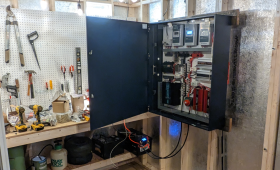myersfamilyhome
New Member
- Joined
- Feb 9, 2021
- Messages
- 140
I'm trying to understand why configuring a system to take advantage of the optimal output and availability of equipment and power isn't talked about very much. I do understand that finances are a challenge in some cases along with the need for split phase but there is a happy medium that has a benefit to it as well.
Here's an example of what I mean:
Solar Charging:
* 200-500w panel/s
* Charge Controller/s that support multiple battery voltages in one (12/24/48)
Storage:
* Battery bank that can be configured between 12-48v but setup as 48v
Inverting:
* High Amp Buck Converter/s to 12v
* High efficiency 12v inverter/s
Unless I'm missing something, this gives you an optimal setup when the following is the goal:
* Maximum charge power from panel/s
* Quickest charging of storage
* Most flexibility in variable system configuration if/when a battery or cell causes an issue
* Most readily available components on the inverter side that can be more budget friendly
Though I've seen no reviews of high output buck converters, they do exist.
Tian Power DCDC 175A 2500W 48V to 12V Buck Converter and 20A 1000W 12V to 48V Boost Bidirectional Converter with CAN Communication, High Power Automotive Driving Charger for RV, Truck, Forklift https://a.co/d/akRM6UD
Here's an example of what I mean:
Solar Charging:
* 200-500w panel/s
* Charge Controller/s that support multiple battery voltages in one (12/24/48)
Storage:
* Battery bank that can be configured between 12-48v but setup as 48v
Inverting:
* High Amp Buck Converter/s to 12v
* High efficiency 12v inverter/s
Unless I'm missing something, this gives you an optimal setup when the following is the goal:
* Maximum charge power from panel/s
* Quickest charging of storage
* Most flexibility in variable system configuration if/when a battery or cell causes an issue
* Most readily available components on the inverter side that can be more budget friendly
Though I've seen no reviews of high output buck converters, they do exist.
Tian Power DCDC 175A 2500W 48V to 12V Buck Converter and 20A 1000W 12V to 48V Boost Bidirectional Converter with CAN Communication, High Power Automotive Driving Charger for RV, Truck, Forklift https://a.co/d/akRM6UD



